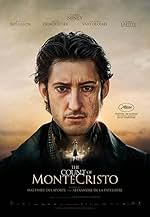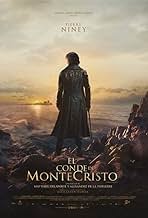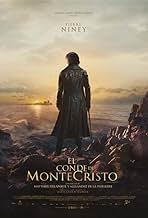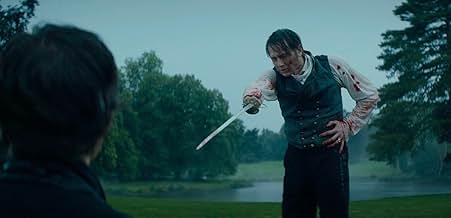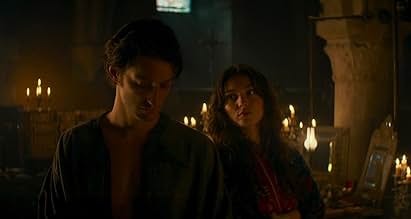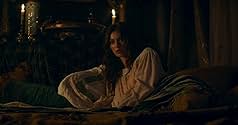Segue un nuovo adattamento del famoso romanzo di Alexandre Dumas.Segue un nuovo adattamento del famoso romanzo di Alexandre Dumas.Segue un nuovo adattamento del famoso romanzo di Alexandre Dumas.
- Regia
- Sceneggiatura
- Star
- Premi
- 6 vittorie e 17 candidature totali
Laurent Lafitte
- Gérard de Villefort
- (as Laurent Lafitte de la Comédie Française)
Stéphane Varupenne
- Caderousse
- (as Stéphane Varupenne de la Comédie Française)
Abde Maziane
- Jacopo
- (as Abdé Maziane)
Riepilogo
Reviewers say 'The Count of Monte-Cristo' adaptation garners mixed reactions, highlighting visual richness, strong performances, and deviations from the original novel. Praise is given to the cinematography, production design, and Pierre Niney's portrayal of Edmond Dantès. However, the script faces criticism for altering key plot points, characters, and the novel's ending, which many feel reduces the story's depth and emotional impact. Some appreciate the modernization and streamlined narrative, while others miss the novel's complexity and moral dilemmas.
Recensioni in evidenza
Usually not a fan of action movies, the wonderful cast as well as the choice of a classic of French literature convinced me to go watch LE COMTE DE MONTE CRISTO. And man I wasn't disappointed !
Despite its three-hour runtime, the movie never bores. When it doesn't keep us on our toes, it shows us eye-popping scenes of 19th century France, leaving us wondering how they made that with only 40M euros ! I guess the beautiful cinematography and clever editing have a role to play in making this movie stand out from much costlier Hollywood productions.
Of course much of the credit also goes to Alexandre Dumas for coming up with such a poignant story, but adapting it for the screen sure wasn't an easy task either, and it was done marvelously here.
I sincerely hope this movie will have a career outside of France, as more people deserve to see this.
Merci Alexandre, merci Matthieu :)
Despite its three-hour runtime, the movie never bores. When it doesn't keep us on our toes, it shows us eye-popping scenes of 19th century France, leaving us wondering how they made that with only 40M euros ! I guess the beautiful cinematography and clever editing have a role to play in making this movie stand out from much costlier Hollywood productions.
Of course much of the credit also goes to Alexandre Dumas for coming up with such a poignant story, but adapting it for the screen sure wasn't an easy task either, and it was done marvelously here.
I sincerely hope this movie will have a career outside of France, as more people deserve to see this.
Merci Alexandre, merci Matthieu :)
I will not deny it, I think the film is really beautiful : production design, costumes, props... and of course lighting (congrats M. Bolduc) and many other details helped make it a wonderful experience for the eyes, in my opinion.
Now with a plot so huge as with Dumas', so many characters, theads, sub-stories and such, the authors had to cut things, adapt, re-write... betray, as is often necessary or critical with any adaptation!
That's a given.
But why dishonor the original author's choices (Dumas')?
Why betray the lessons he wanted to impart : Monte Cristo's moral dilemma, his good nature overall, his help to so many, and unrivaled loyalty to anyone who had been good to him or deserved it in any way ?
Why change Haydée's love for him for a silly romance?
Even Mercedes' understanding of Monte Cristo's actions and why she can't be saved, and why Albert has to follow her are admirable, in the book...
And what are we left with, here?
Pure show?
I can assure you it's not what remains, when you read it.
Now with a plot so huge as with Dumas', so many characters, theads, sub-stories and such, the authors had to cut things, adapt, re-write... betray, as is often necessary or critical with any adaptation!
That's a given.
But why dishonor the original author's choices (Dumas')?
Why betray the lessons he wanted to impart : Monte Cristo's moral dilemma, his good nature overall, his help to so many, and unrivaled loyalty to anyone who had been good to him or deserved it in any way ?
Why change Haydée's love for him for a silly romance?
Even Mercedes' understanding of Monte Cristo's actions and why she can't be saved, and why Albert has to follow her are admirable, in the book...
And what are we left with, here?
Pure show?
I can assure you it's not what remains, when you read it.
Well, this a great piece of cinema, the actors play well, the scenes are well designed and the music is top notch. Yet, at someone that read the book before, a lot of the actual story, is not just missing but heavily modified. This is frustrating and they main reason it's a 8 and not 10, but I guess taking a 6 books story into a 3 hours move isn't that easy. Some of the original characters are missing and grouped into new character (Angelel). So, if you are not a Dumas fanatic, go watch it, you will have a good time ! The 3 hours feel like 20 minutes, with good romance, great costumes, great action scenes and drama.
So I have actually read the book, the real book(s), and not the watered down version you find in the book store. That story is compelling, charcter driven, intricate and the details tell how it all comes together. This while a totally ok movie has nothing of that besides the outlines of the main plotlines. There isnt the good besides the bad, there isnt the ambivalent ending and there isnt the base of it all, the relationship between the Abbé and Edmond who basically becomes a son. Also missing is the back story from the escape to Edmonds arrival in Paris that makes the whole revenge plot believable in the first place. I also cant help but miss the old Mr Villefort whose story while peripher is so central to who Edmond really is as a person. So want to see a french drama during the 19th century that is pretty ok with some good actors, go ahead. Want to immerse yourself in the real story of the Count of Monte Christo? Find and Antiquarian because that is the only place you find this masterpiece.
It's hard not to notice that modern adaptations of classical works often tend to sacrifice depth and complexity for the sake of fast pace and entertainment. As a result, the special atmosphere and emotional depth inherent in the original texts are often lost. "The Count of Monte Cristo" by Alexandre Dumas is not just a twisted story of revenge with many bright twists, it is a reflection on life and how a person is transformed by circumstances and his own decisions. Alas, the new film adaptation, and this, of course, in my opinion, coped with the task of conveying this transformation - satisfactorily, but no more, leaving the characters at a simple and understandable level of archetypes.
Expectations did not come from an empty place, because many people read this fascinating tragedy of revenge and had hopes to see the development and deepening of the characters on a par with the original source. At the same time, the audience was offered a set of events that take place too quickly, as if on a high-speed cinema highway. Deep emotions, nuances of character, dramatic internal conflicts - all this was clearly not enough. But it is these details that make the work alive and truly memorable. Yes, undoubtedly, a thousand pages of a novel cannot be transferred into one film, but this is the power of creativity - the ability to revive images and give the viewer empathy. In the film, all this is there, but dosed, within the framework of the standard form of monosyllabic presentation.
The film is not bad, but spoiling Dumas means being completely incompetent, and, to my joy, I can't blame anyone for that. But I expected more and I'm a little disappointed. The whole film was shot with a 24 mm wide-angle lens, and it was unnecessary: there are clearly not enough close-ups, especially when the actors play well. Despite the decent acting, the characters seem to be unsaid and aimless, reduced to simplified and stripped-down images.
During the viewing, I hoped to see a philosophical reassessment or depth of thought in the scene with "Abbé Faria", but, unfortunately, only the Soviet painting by Georgy Jungwald-Khilkevich with Alexei Petrenko as the abbot was able to prepare the viewer, lay the foundation for the climax, making them realize the suffering of the prisoners and catch the main question: "What are you up to Will you spend your life, for revenge or for good?". After this episode, it became clear that the story would quickly sweep through the pages of the fireproof manuscript, and so it turned out.
The connection with the epoch and with the literary echoes of the past, which give the original its special flavor and indescribable integrity, has disappeared. Perhaps this is a sign of the times. Modern technology allows you to create impressive visual effects, but no technique can replace the power of a story, the ability to convey a mood and invite the viewer into a deep understanding of life. One thing is for sure: trying to adapt classics is always a challenge that requires incredible skill and understanding of the text. This is a difficult task, and, alas, not everyone can overcome this path, but the task was done well, although there was a residue of disappointment.
Expectations did not come from an empty place, because many people read this fascinating tragedy of revenge and had hopes to see the development and deepening of the characters on a par with the original source. At the same time, the audience was offered a set of events that take place too quickly, as if on a high-speed cinema highway. Deep emotions, nuances of character, dramatic internal conflicts - all this was clearly not enough. But it is these details that make the work alive and truly memorable. Yes, undoubtedly, a thousand pages of a novel cannot be transferred into one film, but this is the power of creativity - the ability to revive images and give the viewer empathy. In the film, all this is there, but dosed, within the framework of the standard form of monosyllabic presentation.
The film is not bad, but spoiling Dumas means being completely incompetent, and, to my joy, I can't blame anyone for that. But I expected more and I'm a little disappointed. The whole film was shot with a 24 mm wide-angle lens, and it was unnecessary: there are clearly not enough close-ups, especially when the actors play well. Despite the decent acting, the characters seem to be unsaid and aimless, reduced to simplified and stripped-down images.
During the viewing, I hoped to see a philosophical reassessment or depth of thought in the scene with "Abbé Faria", but, unfortunately, only the Soviet painting by Georgy Jungwald-Khilkevich with Alexei Petrenko as the abbot was able to prepare the viewer, lay the foundation for the climax, making them realize the suffering of the prisoners and catch the main question: "What are you up to Will you spend your life, for revenge or for good?". After this episode, it became clear that the story would quickly sweep through the pages of the fireproof manuscript, and so it turned out.
The connection with the epoch and with the literary echoes of the past, which give the original its special flavor and indescribable integrity, has disappeared. Perhaps this is a sign of the times. Modern technology allows you to create impressive visual effects, but no technique can replace the power of a story, the ability to convey a mood and invite the viewer into a deep understanding of life. One thing is for sure: trying to adapt classics is always a challenge that requires incredible skill and understanding of the text. This is a difficult task, and, alas, not everyone can overcome this path, but the task was done well, although there was a residue of disappointment.
Lo sapevi?
- QuizWith a budget estimated in EUR42.9 million, The Count of Monte Cristo is the most expensive French film of 2024.
- BlooperWhen Albert watches Hydee sing and play the guitar, it is very obvious that she is not even touching the strings half of the time.
- Citazioni
Danglars: The story makes no sense. We're swimming in madness. My boats were still in Marseilles yesterday. I will need a delay to pay you back. If...
Edmond Dantès: You have nothing left, Baron. Everything that was yours is now mine. The only thing you have left are these clothes. Leave Paris, and perhaps I will not let your wife and your daughter starve.
Danglars: But, Count, I...
Edmond Dantès: Do you find me brutal, Baron? "Not only do I know it, but I take pride in it." You should escort your wife home. She looks quite pale.
- ConnessioniFeatured in La grande semaine: Episodio #1.13 (2024)
I più visti
Accedi per valutare e creare un elenco di titoli salvati per ottenere consigli personalizzati
- How long is The Count of Monte-Cristo?Powered by Alexa
Dettagli
- Data di uscita
- Paesi di origine
- Lingue
- Celebre anche come
- Il conte di Montecristo
- Luoghi delle riprese
- Aziende produttrici
- Vedi altri crediti dell’azienda su IMDbPro
Botteghino
- Budget
- 42.900.000 € (previsto)
- Lordo Stati Uniti e Canada
- 529.830 USD
- Fine settimana di apertura Stati Uniti e Canada
- 17.426 USD
- 22 dic 2024
- Lordo in tutto il mondo
- 78.623.140 USD
- Tempo di esecuzione2 ore 58 minuti
- Colore
- Mix di suoni
- Proporzioni
- 2.35 : 1
Contribuisci a questa pagina
Suggerisci una modifica o aggiungi i contenuti mancanti




